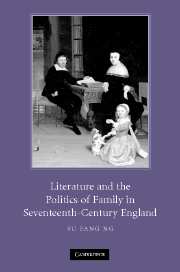Book contents
- Frontmatter
- Contents
- Acknowledgments
- Introduction: strange bedfellows – patriarchalism and revolutionary thought
- PART I REVOLUTIONARY DEBATES
- PART II RESTORATION IMAGININGS
- Interchapter: revolutionary legacies
- 5 Execrable sons and second Adams: family politics in Paradise Lost
- 6 Marriage and monarchy: Margaret Cavendish's Blazing World and the fictions of queenly rule
- 7 Marriage and discipline in early Quakerism
- Epilogue: the family-state analogy's eighteenth-century afterlife
- Index
7 - Marriage and discipline in early Quakerism
Published online by Cambridge University Press: 22 September 2009
- Frontmatter
- Contents
- Acknowledgments
- Introduction: strange bedfellows – patriarchalism and revolutionary thought
- PART I REVOLUTIONARY DEBATES
- PART II RESTORATION IMAGININGS
- Interchapter: revolutionary legacies
- 5 Execrable sons and second Adams: family politics in Paradise Lost
- 6 Marriage and monarchy: Margaret Cavendish's Blazing World and the fictions of queenly rule
- 7 Marriage and discipline in early Quakerism
- Epilogue: the family-state analogy's eighteenth-century afterlife
- Index
Summary
RIVAL STATE
With beginnings in the 1650s, Quakers were one of several radical sects of the English Revolution. Initially enthusiastic and aggressive, the earliest Quakers engaged in flamboyant public proselytizing – including going into trances, prophesying, interrupting sermons, and “going naked as a sign.” Their itinerant preaching and their aggression broke statutes against offenses like vagrancy and blasphemy. By their religious practices – holding separatist meetings, refusing to pay tithes, refusing to give “hat-honour,” and refusing to swear oaths – Quakers flouted the authority of the state. Set apart by their religious unorthodoxy – particularly their refusal to give deference to social superiors – their civil disobedience threatened the state. Parliament was particularly savage in the 1656 case of James Nayler, arrested for riding into Bristol with a group of women, singing and hailing him as Christ. This charismatic reenactment of the messianic entry made Quakers notorious. Vehemently denouncing Nayler, Parliament debated the case for six weeks – with some members calling for his death. His punishment was severe: he stood in the pillory for two hours, was whipped 310 times, had his tongue bored through with a hot iron and his forehead branded with a B for blasphemer. The exaggerated reaction, Christopher Hill suggests, was due to fears by conservative elements of the government that religious toleration would get out of hand, fears that were fueled by the terrifying rapidity with which the Quaker movement was spreading.
- Type
- Chapter
- Information
- Publisher: Cambridge University PressPrint publication year: 2007



